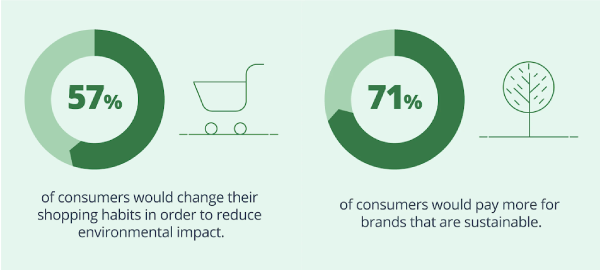Being environmentally friendly is no longer just a nice-to-have for businesses. With increased awareness of the consequences of climate change, it has become more important than ever to be conscious of how our decisions impact the environment. But how does being environmentally friendly help businesses?
Being an eco-friendly business not only helps reduce your carbon footprint but also provides numerous financial and social benefits that can improve your bottom line.
How does being environmentally friendly help businesses? Here are five ways in which going green can actually help you grow your company.
Table of Contents
Financial Benefits of an Environment-Friendly Business
How does being environmentally friendly help businesses financially?
Cost Savings
Environment-friendly businesses can save money in a variety of ways. One way is by switching to renewable energy sources like solar and wind power to reduce energy costs.
Additionally, companies can reduce their water usage by installing efficient fixtures and appliances, which will also help them to conserve resources.
Companies could also save on waste disposal fees by implementing recycling programs that allow them to reuse materials rather than dispose of them in landfills.
Tax Incentives
Many governments offer tax incentives for businesses that are environmentally conscious. These incentives can range from reduced taxes on certain products or services to credits for investments made in green technologies or practices.
For example, some countries provide subsidies for businesses that invest in renewable energy sources such as solar panels or wind turbines.
Additionally, many states have adopted legislation allowing businesses to receive tax breaks when they purchase fuel-efficient vehicles or install other green initiatives like LED lighting systems and smart thermostats.
Increased Profits
An environment-friendly business model can lead to increased profits by attracting customers who prefer eco-friendly products and services.
A company’s commitment to sustainability efforts could also result in positive press coverage which could bring potential customers directly into their doors, leading to higher sales volumes and greater profitability overall.
Improved Brand Image and Reputation
An environment-friendly business can benefit from an improved brand image and reputation.
Positive public perception is a key factor in this, as customers are increasingly looking for businesses that prioritize sustainability. Companies that demonstrate environmental responsibility will be seen favorably by the public, which can lead to increased customer loyalty. Customers who appreciate an organization’s commitment to reducing its impact on the planet may be more likely to remain loyal and purchase its products or services again in the future.
Enhanced employee morale is another advantage of running an environmentally conscious business. Employees want to work for organizations that care about making a positive difference in society and protecting the environment, so they are often more motivated when working for companies with strong green initiatives. This can result in higher job satisfaction levels among employees, leading to greater productivity and efficiency within the workplace.

(Source)
Having an eco-friendly approach also helps businesses comply with regulations related to sustainability. Businesses must adhere to certain standards set by local governments regarding waste management, air quality control, and water conservation efforts so having a comprehensive plan in place avoids costly fines or legal trouble.
Additionally, implementing sustainable practices reduces risks associated with environmental disasters such as oil spills or hazardous chemical leaks due to improper storage/disposal methods used by businesses without proper safety protocols in place.
Finally, health and safety benefits should not be overlooked when discussing the advantages of being an environmentally friendly business. Both employees and customers benefit from reduced exposure to toxins and pollutants present in many workplaces, such as asbestos fibers. Improved air quality resulting from better ventilation systems also contributes significantly towards ensuring healthier conditions inside buildings as well as outside areas surrounding them.
Regulatory Compliance and Risk Mitigation
Businesses must comply with all applicable laws and regulations in order to avoid costly fines or other sanctions imposed by regulatory agencies. For example, a manufacturing plant may need to adhere to air quality standards set by the Environmental Protection Agency (EPA) in order to avoid being fined for releasing pollutants into the atmosphere. Similarly, companies must also follow local zoning ordinances when constructing new buildings or expanding existing ones in order to remain compliant with land use regulations.
Compliance with environmental laws is essential for minimizing legal risks associated with environmental issues such as pollution or hazardous waste disposal. Companies that fail to meet these requirements may face lawsuits from affected parties seeking damages due to their negligence or recklessness. By adhering strictly to relevant statutes, businesses can reduce their exposure to litigation costs related to environmental matters.
Businesses should implement effective risk management strategies specifically designed to address environmental concerns such as climate change or water conservation. These measures can help ensure that companies are prepared for any unforeseen circumstances which could potentially lead them into legal trouble.
Health and Safety Benefits for Employees and Customers
How does being environmentally friendly help businesses in terms of health and safety?
When businesses take steps to reduce their environmental impact, they also help protect the health and safety of their employees and customers.
Reduced Exposure to Toxins and Pollutants
By reducing air pollution, water pollution, hazardous waste, or other toxins in the workplace or surrounding areas, businesses can reduce employee exposure to potentially harmful substances. For example, a manufacturing plant that switches from using fossil fuels to renewable energy sources such as solar power will significantly reduce its emissions of pollutants into the atmosphere.
Better Air Quality
An environment-friendly business can also improve air quality by reducing smog-forming emissions from vehicles or industrial processes. This helps create healthier working conditions for employees who spend long hours outdoors or near busy roads where vehicle exhaust is present. Additionally, improved air quality has been linked with reduced respiratory illnesses among both workers and customers alike.
Less Noise
Environmentally friendly practices can also help reduce noise pollution in the workplace which may lead to better concentration levels among employees while on the job as well as improved customer satisfaction when visiting your establishment. For instance, installing soundproofing materials in walls between workstations could make it easier for workers to focus on their tasks without being distracted by loud noises coming from nearby machines or conversations taking place in other parts of the building.
How Does Being Environmentally Friendly Help Businesses?
When talking about how does being environmentally friendly help businesses, the obvious benefit is reduced environmental impact.
Reduced Carbon Footprint
Eco-friendly businesses take carbon emission seriously. Reducing their carbon footprint involves switching to renewable energy sources and investing in green technologies such as electric vehicles or LED lighting systems. By doing so, businesses can significantly reduce their emissions of greenhouse gases and other pollutants into the atmosphere.
Conservation of Natural Resources
Another important benefit of an environment-friendly business is the conservation of natural resources. Businesses should strive to use resources efficiently by reusing materials whenever possible and minimizing waste production through recycling programs or composting initiatives. Additionally, they should look for ways to conserve water usage by installing low-flow fixtures in bathrooms and kitchens or utilizing rainwater harvesting systems for irrigation purposes.
Preservation of Biodiversity
Finally, businesses should focus on preserving biodiversity in order to protect species from extinction due to human activities such as deforestation or pollution caused by industrial processes. Companies can do this by creating wildlife habitats onsite, supporting local conservation efforts, and avoiding activities that could lead to habitat destruction such as overfishing or unsustainable logging practices.
Conclusion
How does being environmentally friendly help businesses? From financial benefits and improved brand image to regulatory compliance and health and safety benefits, the advantages of running an environment-friendly business are undeniable.
Businesses can take the initiative to help protect our environment by implementing sustainable practices. By making changes like reducing energy and water consumption, using renewable resources, recycling materials, and investing in green technology, businesses will not only benefit from cost savings but also contribute to a healthier planet for future generations.





